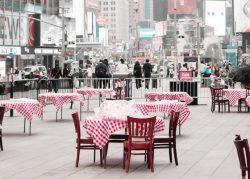Kathy Arntzen and her husband have lived in a condo on Cornelia Street for 32 years. But during the pandemic, the character of her sleepy Greenwich Village block has fundamentally changed.
Seven restaurant sheds have popped up, along with a plethora of outdoor cafe seating, all on Arntzen’s 450-foot-long street.
With the sheds came music blasting from speakers, black trash bags on the curb and rats scurrying between planters.
“It’s losing its identity,” Arntzen said. “I don’t think [the restaurants] realize that there’s actual people who live in these buildings.”
Arntzen is one of 23 petitioners suing to overturn the de Blasio administration’s decision to make its Open Restaurants program permanent. The complaint was filed in New York Supreme Court Oct. 18.
The program lets eateries set up tables and chairs on the sidewalk and parking lanes in front of their establishments. In September 2020, Mayor Bill de Blasio announced the program was here to stay. Paving the way for that, the Department of Transportation had on June 18 issued what’s called a negative declaration, concluding that the proposed action would have “no significant effect upon the environment.”
In a statement to The Real Deal, a spokesperson for the city’s Law Department said the environmental review was “thorough, complete and found no adverse impact.”
“This is the first step in crafting a permanent program, and New Yorkers will continue to have opportunities to share their thoughts on how Open Restaurant structures should be designed,” the statement said.
Petitioners in the lawsuit have plenty of thoughts to share.
“It would be nice if the City Council or the mayor would come down and take a walk around,” Arntzen said. “They want to push those things through and then have the conversation, but the conversation should happen before you change a zoning text.”
Read more


Beyond being a nuisance to residents, restaurants also don’t seem to be following the rules. A survey of 418 restaurants found 93 percent were out of compliance with at least one of the guidelines, according to a report by the office of City Council Speaker Corey Johnson. Neighbors included it in their lawsuit.
“I’m sort of shocked that people are so cowed by the notion that some restaurant has a right to the lands in front of it to use public space however they want,” said their lawyer, Michael Sussman said. “They didn’t rent that space, they’re not paying for that space.”
Diem Boyd, a single mother who lives on the Lower East Side, has always been surrounded by restaurants, bars and clubs. Indeed, the area where she lives has been nicknamed Hell Square. But with Open Restaurants, the neighborhood has turned into what her affidavit calls a “war zone.”
“Fundamentally, you’re giving up public space to the private sector full on,” Boyd said in an interview. “Landlords and the hospitality groups, restaurants, bars, clubs have now just taken ownership of our public space.”
In a statement, Andrew Rigie, executive director of the New York City Hospitality Alliance, countered that outdoor dining is “beloved by countless New Yorkers.”
“It’s unfortunate that the people filing the lawsuit seek to obstruct and end Open Restaurants throughout the five boroughs, instead of playing a constructive role in developing an enhanced version that addresses their concerns,” the restaurant trade group leader added.
The program has certainly been a blessing for restaurants’ landlords, who are essentially renting extra square footage, although before Covid, limited sidewalk seating was allowed through a cumbersome permit system.
At the onset of the pandemic, Open Restaurants was seen as a saving grace for establishments, whose indoor capacities were limited. Even petitioners say that the program was necessary during lockdown. But its popularity led the mayor to cement it in place.
Unhappy residents not only sued but also complained to their elected officials. Some responded.
In early October, a group of city lawmakers issued a statement calling for stricter limits on outdoor dining and arguing that the text amendment to make it permanent would result in an “unmanageable program throughout the city.”
